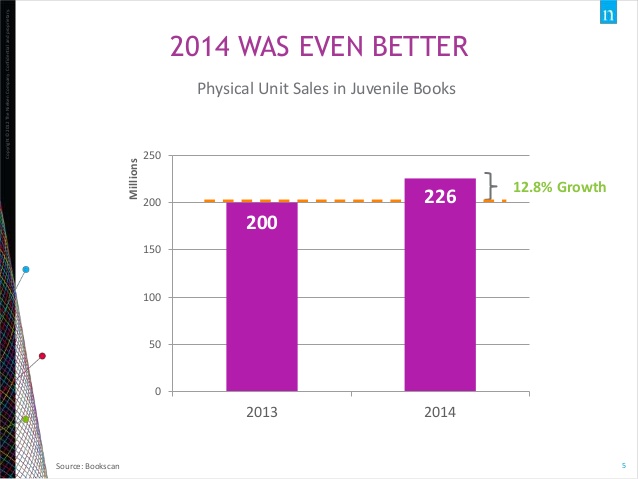Launch Kids celebrated its 4th year on the first day of Digital Book World on January 13th, 2015 at the Midtown Hilton. The morning sessions were data-rich and the rest of the afternoon showed attendees how digital for kids grows through community and storytelling.
Data
One of the most shocking pieces of data came from Jonathan Nowell from BookScan’s presentation: 80% of YA titles are purchased by adults for themselves, which brings up some interesting questions about audience and genre:
.@Nielsen data: 80% of YA in USA are purchased by adults for themselves. Are these actually kids books, then? #LaunchKids
— Eric Huang (@dinoboy89) January 13, 2015
Nowell’s presentation had plenty of heartening news about the children’s book market too. 2014 saw a significant boost in sales in children’s books.
But David Kleeman from PlayCollective showed us the stiff competition that children’s books face every single day: tablets and smartphones.
A big take away from the morning is that digital efforts can boost print sales significantly.
Eric Huang from Made in Me explained that some important sales from their company have come from print rights from some of Made in Me’s popular digital-only books.
Communities
And some of the digital-to-print success of course comes from online marketing. Director of Marketing at Random House Children’s, Kim Lauber talked about the big success of We Were Liars, due in large part to their marketing efforts on Tumblr.
Morgan Baden at Scholastic echoed the same sentiment saying “You know a book is going to be a big deal if we launch a Tumblr for it.”
Tumblr is an attractive place for marketing because of the communities within Tumblr that can make campaigns exist without the marketers. Lauber said, once their images hit Tumblr and the book came out lots of fan art and original posts about the book blossomed all over the site.
Another community heavy area of the internet is the fanfiction community. Lots of young people spend time reading and writing there to be a part of a group that loves the same thing Lanie Taylor from Alloy Entertainment admitted that she came to fanfiction as an outsider but what she sees is that “The object is what gets you, but the community is what sustains you.” Wattpad’s Ashleigh Gardner talked about how celebrity fanfiction is on the rise, and cited One Direction fanfiction being one of the most popular fanfics on their site, mentioning the success of Anna Todd’s After.
Storytelling
Helping a story come to life doesn’t always begin with an author. Co-owners of Paper Lantern Lit, Lauren Oliver and Lexa Hillyer discussed stories built from intellectual property, or IP, with President and Publisher of HarperCollins Children’s Susan Katz. Katz said that HarperCollins’ use of IP came from a desire to have “full creative rights” of a story, but maintained that flexibility with the author is essential.
2014 seemed like the year of ebook subscription services and children weren’t left out of this trend, but catering to kids creates its own set of challenges. As Neal Shenoy from Speakaboos stated, the person buying the subscription isn’t the person reading the story.
#DBW15 #LaunchKids @NealShenoy “Your biggest challenge [of a subscription for kids] is that customer and user” are not the same person.
— Porter Anderson (@Porter_Anderson) January 13, 2015
Each of the panelists from this segment came from three different subscription services Speakaboos, MeeGenius, and SmartyPAL (which will officially launch this month) feature ebooks unique to them. Speakaboos and MeeGenius also have licensed content from partners like Thomas the Tank Engine and Sesame Street, respectively.
Barbara Marcus, President and Publisher of Random House Children’s wrapped up the day very well responding to Mike Shatzkin’s question: What really is the difference between children’s publishing and adult? “We don’t publish for a 6 week cycle. We publish for backlist…We’re on another planet.”








